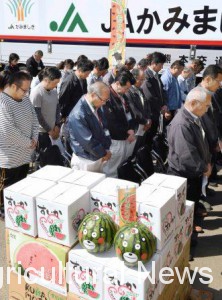Kumamoto prefecture in Japan marked one-year anniversary of massive earthquakes, including ones of 6.5 and 7.3 magnitude, on April 14, when a watermelon producers group of Kamimashiki Agricultural Cooperative (JA) held a watermelon shipment ceremony at JA’s grading center at Mashiki town in the prefecture.
The ceremony was organized just prior to a peak season of shipping watermelon, which is one of the major products in the town.

Farmers and JA’s representatives offering a silent prayer at the watermelon shipment ceremony held on April 14 (Mashiki town, Kumamoto prefecture)
A number of farmers and JA’s representatives gathered to express their condolences on victims of the quakes and pledged to accelerate their efforts to revitalize agricultural production in the JA’s territory.
The strong earthquakes claimed 37 lives in Mashiki town, whom the farmers and JA people offered a silent prayer at the watermelon shipment ceremony.
When the powerful earthquakes struck the town and other cities in Kumamoto prefecture one year ago, the watermelon grading facility was heavily damaged.
All the members of the producers’ group and JA’s staff members, however, made every effort to continue the shipment of watermelons by grading them with hands for three days just after being hit by the quake under the slogan of preserving their production area of watermelons.
One of the producers took a look over the past year, saying “What is most important for watermelon production is pollination and fruiting. We cannot produce any good watermelons without our intuition and good timing. Last year we were hit by the heavy quakes. Lots of our fellow farmers had their house collapsed and some producers lost their family members. But none of our member producers failed to visit their farm lands every day and continued to take care of the plants.”

